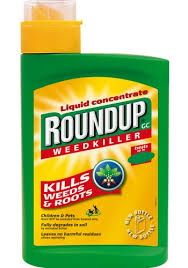
Glyphosate has been classified as a probable carcinogen.
The news grabbed the lead about Roundup being a carcinogen – except that they often left out the details. Start with what we know about this agent. It works on an enzyme that is found in plants, and not one that is found in people or animals or even fish. So the active part of this chemical does not affect humans.
Chemicals that cause cancer do so by changing the DNA, and there is a quick test that is done with bacteria. Since bacteria take 20 minutes to make a generation, an alteration in their DNA will be quickly seen, as opposed to waiting for months to tell with rats, or years for humans. The test will have false positives – meaning it is more likely something will be found that causes a mutation in bacteria than will be actually harmful to humans. In the case of Roundup, the active chemical glyphosate does not cause mutations.
So it was tested in rats- and in rats there was found to be “oxidative stress” but no carcinogens. So why was this chemical listed as a “carcinogen?”
In human cells in culture, there was an increased level of problems- but those human cells in culture are exposed in ways that normal cells are not – for example, they do not have a liver that detoxify the cells.
The WHO classification came among those industrial workers exposed to high levels of glyphosate and other chemicals. Among those workers, there was a higher risk of non-Hodgkins lymphoma. However, the relative risk of those studies was 1.3. That is a low relative risk- consider that a relative risk of 1 means there is no correlation, less than one indicates inverse correlation – and most don’t consider the correlation “interesting” until it is 2 or 3. The relative risk of lung cancer and cigarettes, for example, is 20.
The reason many use Roundup is that it is far less toxic than other weed killers. It does not affect the human system, and in toxicity it is 1/200th as toxic as caffeine.
Here is the proof: Toxicity is determined by a value called LD50. LD50 is a standard measure of acute toxicity for chemicals, expressed in the milligrams (amount) of chemical per kilogram (body weight) that it takes to kill fifty percent of a population of test animals. LD50 is a standard measure used to compare toxicities of compounds.
Glyphosate has a LD50 of 5600 mg/kg based on oral ingestions in rats, according to EPA assessments , placing it in Toxicity Category III. The EPA ranks chemicals in four categories, I being the most toxic and IV being the least. To compare, caffeine has a much lower LD50 of 192 mg/kg based on oral ingestions in rats. (see reference below).
The use of Roundup has been increased because most genetically modified corn and soy are resistant to Roundup so you can use a lot of Roundup and not a lot of other more toxic herbicides. The issue with all such is that super weeds resistant to herbicides will always be an issue. I wrote about this in 5 myths about GMO 5 and what you really need to worry about.
While people worry about the evil “Monsanto” – their patent on glyphosate ran out in 2000 and there are over 200 corporations making this for weeks.
“Germany, acting as the European Union rapporteur member state (RMS) recently submitted their glyphosate renewal assessment report (RAR) to the European Food Safety Authority (EFSA) in January 2014, recommending re-approval of glyphosate for use in Europe with increase in the acceptable daily intake (ADI) from 0.3 to 0.5 mg per kg body weight per day.
The overall findings of the RAR are that glyphosate poses no unacceptable risks. Glyphosate is not metabolized or accumulated in the body, not genotoxic, not carcinogenic, not endocrine disrupting, and not considered persistent or bioaccumulative; it has no reproductive toxicity, no toxic effects on hormone-producing or hormone-dependent organs, and no unacceptable effect on bees.” – Arthur Doucette
The Germans who did that looked at the same data as the WHO working group.
But Roundup was assigned to 2A – probably carcinogenic to humans – where most of the headlines and news reports seem to indicate there is proof of its carcinogenicity- as of this point there is not.
When looking at their data – there is more risk of carcinogens from alcohol you drink than Roundup you use on your weeds – the byproducts of getting too much alcohol (feeling the buzz) are classified as higher carcinogens than Roundup. (acetaldehyde – group 1– Roundup group 2A). Still -don’t drink Roundup – and while it isn’t as toxic as many think- if you have a garden, using a bit of elbow grease and pulling weeds is better than spraying with any chemical.
Feeding a Hungry Planet
The question is what can we do better? How can we feed a hungry planet? It is a large question and we need answers. We don’t want to poison ourselves in the process, or poison the most innocent among us. It is easy for those of us who can afford to go to a Farmers Market and buy organic produce, or grow it ourselves, but that is not a sustainable answer. When vegans say they have the answer- they don’t. Their model is not sustainable, nor ecological – the cycle of life.
References:
Crit Rev Toxicol. 2015 Mar;45(3):209-18. doi: 10.3109/10408444.2015.1010194. Epub 2015 Feb 17. Review of genotoxicity biomonitoring studies of glyphosate-based formulations. Kier LD1 Int J Environ Res Public Health. 2014 Apr 23;11(4):4449-527. doi: 10.3390/ijerph110404449.
Non-Hodgkin lymphoma and occupational exposure to agricultural pesticide chemical groups and active ingredients: a systematic review and meta-analysis. Schinasi L1, Leon ME2.
